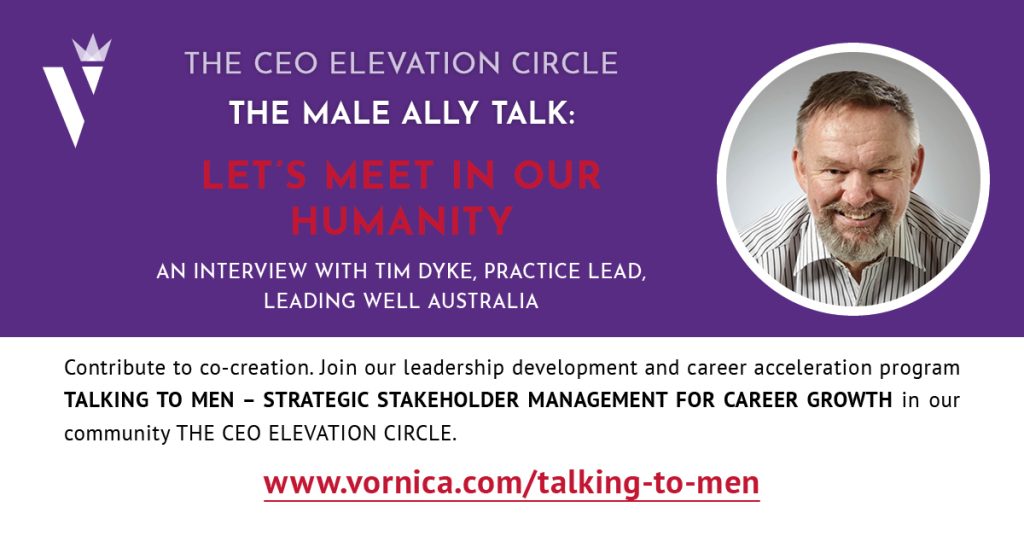Someone once described me as changing careers every fifth year. I did change, from a veterinarian to an academic and to a government institution employee, but ultimately I landed on people development and I feel very happy here.
I work with both men and women. And I also work with transgender clients, which has given another widening perspective on the role of gender in the way we think about it and the way we identify at work. I really enjoy coaching in the diversity, equity, and inclusion space, including in the LGBTIQ community.
One of the most significant challenges both women and men face is not having had much leadership training and awareness development. We may have had some partial, functional training, but we still face major gaps in self-awareness. We all have stories from the systems that we have experienced in the past - our family system, educational system, our social system, our professional system, and our work systems, and those stories affect the way that we work now.
Men have a challenge in leadership positions, particularly as they go higher and higher, with being silent and trying to work it out for themselves. That's one of the stories that men / boys hear as they're growing up: Work it out for yourself, you're the you're the rock, you're the protector, you're the provider, and so they don't have an opportunity to talk and reflect at a deeper level.
For women, on the other hand, the challenge is a lack of confidence. Brenné Brown's work on shame is fascinating here from a gender point of view. Basically, the basis of shame for women is perfectionism , and the basis of shame for men is strength. So, anything that shows that a woman is not perfect will be shameful, and for a man anything that shows a lack of strength - not being able to fix things, having to talk to somebody else - is a sign of weakness. Showing emotion is a sign of weakness, with the message being:. Don't be a girl. Don't be a sissy.
Therefore, for women a lack of confidence in going: Well, I'm not ready in this meeting yet because I'm not perfect. I'm not ready to express my views, so I'm going to shut up and not say anything. And the feedback then is: Well, you don't participate in meetings. Whereas a man is trying to demonstrate his strength by being noisy, by interrupting, by answering questions.
If you look at indigenous societies, women played a very important role. Indeed, transgender people played an important role because oftentimes transgender people were the shamans. They were the witch doctors. They were revered irrespective of gender.
I think the first thing we all need to do is to not start despising and hating the male predominance and the current system. I know that's hard, but when what what people are doing in fear and hate is they're actually disconnecting, which goes against the feminine energy. So, you know, try and remain within the system, and to be in flow with it.
The other thing that may may be challenging is that, as I mentioned, I'm starting to write a book on men in leadership, which is a forgotten topic. And one of the things that's coming out of that is not to criticise men and say: You've done it wrong, not necessarily to criticise the system, the male system of privilege and bias and things that have had have come from our fathers and grandfathers, but to really approach men from a human point of view. And so I encourage women leaders to also look at the human and to look at the space between the two, which is to me the professional relationship.
Really, go deeper in your compassion for yourself, but also for the system and for the fact that the men in the system have been brought along in that system, and they've also suffered as a result of the system as well.
One of my favourite phrases is being patiently persistent. Stick with your value set, know the organizational value set, and be patiently persistent in promoting those.
Let's not carry the baggage of gender, either individually with a person that we're sitting across from, or from the system. Let's not carry the bad bits of that with us. From a fear and a hate point of view, let's be more in the flow of the feminine energy and go deeper. Dive into the river rather than keep looking at the banks and talk about how they're restricting you. I think that's a maturity for women and men alike, and what matters is to continue being patiently persistent with that.

Connect with Tim via his LinkedIn profile and on the page of the Leading Well Australia.
Register for our February 2024 leadership development and career acceleration program TALKING TO MEN - STRATEGIC STAKEHOLDER MANAGEMENT FOR CAREER GROWTH. The program is a FREE OFFER to the members of our community of practice for outstanding women leaders THE CEO ELEVATION CIRCLE.